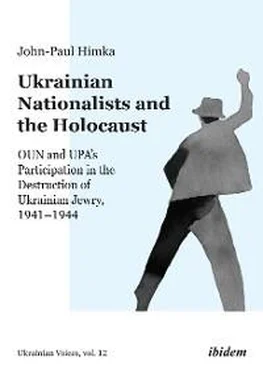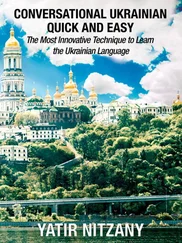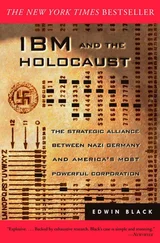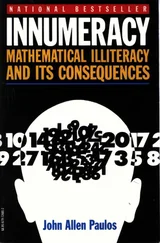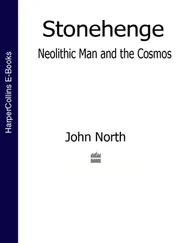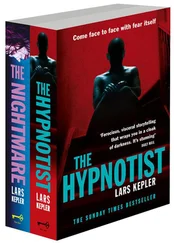1 ...7 8 9 11 12 13 ...29 More interesting was a book on “the behavior of the local population of Eastern Galicia in the years of the ‘final solution of the Jewish question’“—Zhanna Kovba’s Liudianist’ u bezodni pekla (Humaneness in the Abyss of Hell) published in 1998 by the Judaica Institute in Kyiv. Kovba conducted extensive archival research, consulting in particular the records of the Ukrainian Auxiliary Police in the State Archive of Lviv Oblast (DALO) and OUN documents in the Central State Archives of Supreme Bodies of Power and Government of Ukraine (TsDAVO). She consulted Jewish, Polish, and Ukrainian memoirs and also interviewed many people from throughout Galicia who had lived through the events of World War II. It was a book with an openly declared agenda: to destroy “the two fundamental deceitful myths which impede objective perception of the relations among peoples in these difficult times: that Ukrainians were almost the instigators of German crimes against the Jews...; that Jews were guilty of annihilating Ukrainians under Soviet rule.” 96And although Kovba had a tendency to make generalizations and prefer evidence that showed both Ukrainians and Jews in a favorable light, 97she also included information that went against the grain of her overall interpretation. She was unwilling to hazard an evaluation of OUN’s stance and actions during the Jewish tragedy because she found the evidence too contradictory; more research was required in order to make sense of things. 98What comes through most clearly in Kovba’s book is the mixed feelings of the 1990s: with the collapse of communism, both Jewish suffering and Ukrainian suffering were being articulated, and it was difficult to afford recognition to and reconcile them both. 99
The emergence of a cult of OUN and UPA in Ukraine provoked a reaction from a maverick within the Ukrainian diaspora in North America, Viktor Polishchuk. Polishchuk had been born into an Orthodox family in Volhynia, but in 1940, during the first period of Soviet rule in the region, he and his mother and siblings were deported to Kazakhstan. (His father had been arrested by the Soviets in 1939 and was never seen again.) They were allowed to return to Ukraine after the Soviet reconquest in 1944, but to Dnipro oblast rather than Volhynia. In 1946 the family moved to Poland (Polishchuk’s mother was Polish). Polishchuk studied law there and worked as a lawyer and a prosecutor; but after he openly declared his Ukrainian nationality in 1956 he was fired from the prosecutor’s office and endured other instances of discrimination. In 1981 he emigrated to Canada, where, being very particular about proper Ukrainian usage, he worked as an editor in Ukrainian-language media. Based in Toronto and well informed through the circumstances of his employment about Ukrainian diaspora life, he came into contact with nationalist circles; he had not been acquainted with nationalists in Ukraine or Poland. Although he had no personal experience of what OUN-UPA had done in Volhynia during the war, he knew from friends and relatives that the nationalists had slaughtered many of its former Polish inhabitants, including members of his own extended family. 100
A follower of the debates in Ukraine after the fall of communism, he was upset by prominent political and cultural figures calling for the rehabilitation of OUN and UPA and blamed the Ukrainian diaspora for reintroducing nationalism to Ukraine. 101This is what provoked him to write Hirka pravda (Bitter Truth), published at his own cost in 1995. (The book appeared in Polish in the same year and later in an English translation.) The text was an indictment of OUN and UPA for the mass murder of the Polish inhabitants of Volhynia. At this time, by his own admission, Polishchuk did not have enough material to write about UPA’s murder of Jews and others. 102Later on he found plenty of relevant documentation, 103but his documentary publications remained focused primarily on the murder of Poles. 104His 1995 text did not yet use archival material, although he hoped that soon such material would become available. 105Later Polishchuk did gain access to the relevant archival documents and cited and reproduced them in his publications. But the 1995 text was based entirely on published sources as well as some personal communications.
Polishchuk’s book was not well received by Western, Ukrainian, or Polish historians, even though Polishchuk wrote from an anti-Soviet perspective and was careful to make a distinction between Ukrainians as such and OUN. 106The prolific Canadian historian of modern Ukraine David Marples categorized the book as differing little from the Soviet perspective “in terms of the one-sidedness of the outline.” 107Volodymyr Serhiichuk, a pro-nationalist Ukrainian scholar best known for numerous documentary compilations on modern Ukrainian history, devoted a short book to a refutation of Polishchuk’s Hirka pravda . 108Polishchuk himself he called a “supposed Ukrainian” ( nibyto ukrainets’ ). Yurii Shapoval, one of the first Ukrainian historians to work with NKVD documents, rejected Polishchuk’s work as anti-Ukrainian. 109The dean of Lviv’s Ukrainian historians, the late Yaroslav Isaievych, labeled Polishchuk “a ‘professional’ of anti-Ukrainian hysteria.” 110Polish specialists in modern Ukrainian history were of a similar opinion. Ryszard Torzecki called him a former prosecutor for the NKVD (which he was not) and felt that he “was not worth talking about.” 111His views were also criticized by Rafał Wnuk, although not as vehemently: “W. Poliszczuk holds a special place among the non-scientists. As a Ukrainian political scientist who deals, so to speak, ‘scientifically’ with the problem of Ukrainian nationalism, he is sometimes seen as a credible person.” 112Both Shapoval and Torzecki equated Polishchuk with a much less credible writer, the propagandist Edward Prus. 113
In my opinion, this was not a fair equation. There are one-sided authors, and there are unbalanced authors. Prus, unfortunately, belonged to the latter category. In communist Poland he specialized in propaganda against the Ukrainian Greek Catholic church and Ukrainian nationalists and continued in the same vein after communism’s collapse; in both eras he was closely associated with the Polish nationalist right. Prus had been born in and survived the war in Galicia. As a teenager he joined in the defence of Poles threatened by UPA and later fought UPA in the “destruction battalions” ( istrebitel’nye batal’ony ). 114He later emigrated to Poland, earned a doctorate at the University of Warsaw, held various academic posts—none of any prominence, and wrote prolifically.
The book most relevant to the concerns of this monograph is Prus’s Holocaust po banderowsku (Holocaust Banderite-Style), published in 1995. Among much else, the book included an account of a meeting Prus claimed he had in London with Karl Popper, whom he described as “undoubtedly one of the most outstanding Jewish thinkers of the twentieth century.” According to Prus, Popper called him, i.e., Prus, “the most outstanding expert in this area [the history of UPA] in Poland, and not only in Poland.” Also, Popper supposedly expressed amazement that the president of Ukraine at that time, Leonid Kravchuk, had not condemned the murders perpetrated by Ukrainian nationalists against Jews and Poles. “And he warned the Jews that they should stop playing together with Ukrainian nationalists at the expense of the Poles, because this fraternization with criminals under the flag of totalitarianism is a blind alley, a road to nowhere.” 115To me, this account sounds like a fantasy or at least a hearty embellishment. (Popper passed away shortly before Holocaust po banderowsku was published.)
I think there was also a strong dose of fantasy in the “evidence” he brought to bear. Much of what he had to say was based on personal communications in his possession and was therefore unverifiable. Sometimes he gave proper citations for material he quoted, but in other cases he offered no citations whatsoever. For example, Holocaust po banderowsku contained a long quotation very relevant to the theme of this study attributed to Mykhailo Stepaniak, a member of the central OUN leadership captured by the Soviets; the quotation concerned the Third Extraordinary Assembly of OUN (August 1943). 116Prus offered no citation, although presumably the text would have been taken from the record of one of Stepaniak’s interrogations. I have not, however, been able to find the passage Prus quoted in the archival record of Stepaniak’s interrogation of 25 August 1944 117nor in published versions of his interrogations. 118Moreover, the quoted passage refers to the presence of Ivan Mitrynga at the congress, which seems highly unlikely, given that Mitrynga had broken with the Banderites in September 1941 and had joined forces with their rival Taras Bulba-Borovets. I suspect that the passage was the product of a vivid imagination rather than an excerpt from a genuinely existing document.
Читать дальше
